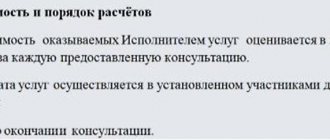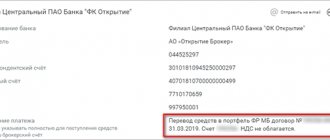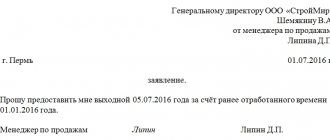Good day. If anyone doesn’t know, Stefania Volna advises and advises you. I am telling you my experience and knowledge in law, which in total is more than 15 years, this makes it possible to give the right answers to what may be necessary in various situations and now we will consider - Thanet Company. If in your particular case you need an instant answer in your city or online, then, of course, it is better to get help on the website. Or it’s even easier to ask regular readers who have previously encountered the same question in the comments.
Attention please, the data may not be relevant at the time of reading, laws are updated and supplemented very quickly, so we look forward to your subscription to us on social media. networks so that you are aware of all updates.
Consequently, it can be assumed that both the issuance of wages in cash and the transfer of it to the account of a non-resident are equivalent from the point of view of its legality and are determined only by the agreement reached on this issue by the employee and the employer.
- ordinary circumstances (monthly) payment of wages, maternity benefits, sick leave - 3;
- repayment of debt to an employee under a writ of execution - 2;
- payments to an individual under a civil contract for the provision of services (not considered wages) - 5.
Decoding payroll codes
A payslip is a document that is drawn up by the employer to inform the worker about the accruals that are due to him. The obligation to draw up payment sheets follows from the provisions of Art. 136 of the Labor Code of the Russian Federation, according to which the employer is obliged to inform workers in writing on a monthly basis:
The procedure for accepting, recalling and returning (cancelling) payment documents (including those with registers) is established by the bank. This information must be specified in the agreement with the bank, as well as by posting information at customer service points (clause 2.2 of the Regulations approved by the Bank of Russia dated June 19, 2021 No. 383-P).
The deadline for paying contributions to compulsory pension (social, medical) insurance is related to the date of salary accrual, and not to the date of its payment. Therefore, contributions from the December salary should be transferred no later than January 15 (Part 5 of Article 15 of Law No. 212-FZ of July 24, 2021).
Deadline for crediting money
The list of documents required to conclude an agreement for the issuance and servicing of salary cards is established by the bank. Since the card is opened not for an organization, but for an employee, in any case, you will need to provide information about employees (photocopies of passports, etc.) (clause 3.1 of Bank of Russia Instruction No. 153-I dated May 30, 2021).
But what to do with payments that may be subject to collection? After all, not all transfers fall under the categories established by law. Such situations are also provided for. In the purpose of payment, you must make an entry in the following format:
We recommend reading: How Bailiffs Can Punish For Flooding an Apartment
This value is indicated in the payment order if the payment made is not subject to recovery restrictions in accordance with Part 2 of Article 101 of Federal Law 229. For example, funds for compensation for damage to health. As well as compensation from the budget for victims of man-made and radiation disasters.
Code No. 3.
The initiative to approve the new coding was taken to indicate to banking institutions the types of income from which debts cannot be withheld under writs of execution. In turn, there are three types of such revenues, indicated by the corresponding numbers:
If you make a mistake in it, then when funds arrive in the Treasury account they will not be classified as the correct payment. As a result, the organization will have an arrears and will be charged penalties for late payments.
Paying wages to a foreigner: in cash or by card?
Foreigners are one of the biggest challenges for the payroll and HR accountant. Because there are countless peculiarities regarding personal income tax, insurance premiums, benefits, registration.
Moreover, there are also features in the payment of wages that should not be forgotten, especially if your company traditionally pays wages in cash. We will talk about this in the article.
Transfer of salary to a foreign currency non-resident
Payment of wages to a foreigner is based on the following regulatory documents:
- Part 3 of Article 136 of the Labor Code - it states the employer’s obligation to pay wages;
- Federal Law of December 10, 2003 No. 173-FZ “On Currency Regulation and Currency Control” - this law defines the concepts of tax resident and tax non-resident that are important for us.
The employing organization is classified as a currency resident in accordance with clause “c”, clause 6, part 1, article 1 of Law No. 173-FZ.
A foreign citizen who temporarily resides in the Russian Federation and carries out labor activities at the same time is recognized as a foreign worker (paragraph 14, paragraph 1, article 2 of the law of July 25, 2002 No. 115-FZ).
Thus, a foreign worker does not belong to persons permanently residing in the Russian Federation on the basis of a residence permit, and therefore, for the purposes of currency legislation, he is recognized as a foreign currency non-resident (subclause “a”, clause 7, part 1, article 1 of Law No. 173-FZ ).
Please note: the concepts of “currency resident” and “tax resident” are not identical! Unlike tax residency, the concept of a currency resident is not related to the number of days a foreigner stays in the Russian Federation in a given year, but to the availability of a residence permit.
How is a foreigner's salary paid?
The transfer of wages to a non-resident - an individual who is not a permanent resident (who does not have a residence permit) is presented as a legal alienation of the currency of the Russian Federation by a resident in favor of a non-resident. This is a currency transaction (clause “b”, clause 9, part 1, article 1 of Law No. 173-FZ).
There is a rule for settlements on currency transactions: they are made by residents (in our situation, employers) only through bank accounts in authorized banks or by transfer of electronic funds (Part 2 of Article 14 of Law No. 173-FZ).
So what happens, it won’t be possible to pay from the cash register to an employee of a foreigner temporarily staying in the territory of the Russian Federation? Rosfinnadzor answered this question quite unequivocally in the Information as of 08/07/2014 “On the payment of wages to non-resident individuals”: the possibility of paying wages to foreign employees from the cash desk in cash is not provided for by currency legislation. The same point of view was expressed by the Ministry of Finance - Letter dated August 29, 2016 No. ZN-4-17/15799 and the Federal Tax Service - letter dated August 29, 2016 No. ZN-4-17/15799.
Thus, there are no options - the salary of a foreign currency non-resident is paid to the card . The employer is recommended to include in employment contracts with foreign workers a condition on the transfer of wages to a bank account, or to include this condition in the collective agreement (Part 3 of Article 136 of the Labor Code).
How will they be punished for paying wages to non-residents in cash?
What could threaten an organization that nevertheless paid a salary to a foreign worker from the cash register in cash? She faces serious fines - from three-quarters to one time the amount of the illegal currency transaction. The basis for an administrative fine is the implementation of currency transactions in violation of currency legislation (Part 1 of Article 15.25 of the Code of Administrative Offenses of the Russian Federation).
How can currency auditors find out about your “sins”? They do not come with checks and are not able to track your cash transactions. And at least from the representatives of the tax office who checked you, who, during the inspection, saw the payment of wages to foreigners in cash. Tax inspectors are authorized to draw up administrative protocols for these offenses.
However, the offense has a statute of limitations - 1 year from the moment of its commission (Part 1 of Article 4.5 of the Administrative Code; Clause 14 of the Resolution of the Plenum of the Supreme Court of March 24, 2005 No. 5).
In the past, the courts sided with organizations
Courts often generally refuse to recognize the payment of wages to foreigners in cash as an offense and have given the following arguments:
1. Foreign exchange transactions between non-residents and residents are carried out without restrictions , with the exception of certain transactions that do not include the payment of wages in cash. This means that this operation is permitted by currency legislation. Currency transactions are carried out without restrictions, for which a special procedure is not established (Part 2, Article 5, Article 6 of Law No. 173-FZ).
2. The rules of the Labor Code also apply to foreign citizens. And if we turn to him, we will read that the salary is paid to the employee in rubles in the place where he performs the work or is transferred to the bank account specified by him, if this is provided for in the labor or collective agreement (Articles 11, 131, 136 of the Labor Code).
Those. The employer does not have the right to independently decide to transfer money to foreign employees. And he cannot open an account for an employee if an application has not been received from him.
3. Whether to open a bank account or not is a decision made by a non-resident employee , because he has the right, but not the responsibilities (Part 1, Article 13 of Law No. 173-FZ).
4. If the employee has not expressed a desire to receive money into a bank account, he must somehow be given a salary, because the employer is responsible for the delay in payment of wages (Article 142 of the Labor Code).
5. All irremovable doubts, contradictions and ambiguities in acts of currency legislation are interpreted in favor of residents and non-residents (Part 6, Article 4 of Law No. 173-FZ).
Payment of wages to foreigners - how is it now?
Thus, at the moment, transferring salary to a non-resident in cash is very risky. If you go to court and the decision is not in your favor, the fines are very high. Therefore, if you do not want to allow even the very possibility of such claims being brought against you, payment of wages to a foreigner should be made through bank cards.
Bank refusal to transfer salary by bank transfer
Then suddenly such a problem arose with the bank. I tried to pay an employee's salary by bank transfer using a payment order. Those. The LLC debits funds from its corporate account and sends them to the account of the individual. faces. For specifics, an LLC account in VTB-24, and an individual account. persons in Sberbank. Not only that, I also paid personal income tax. What happened as a result? The bank missed the personal income tax payment. But no salary! I went to Bank Client Online. There the error message is as follows: I called the VTB-24 call center. There the girl told me that their bank did not miss the transaction, because... They have a physical system in their system. the face passes as NOT
resident!
And now we need it on Monday. call the currency control department and deal with them. Here I have 2 questions: 1.) Regarding resident-non-resident. As I understand it
, we are talking about
a tax
resident. It seems that the law does not talk about any other cases. But there we are talking about physical presence on the territory of the Russian Federation, and not about the presence of Russian citizenship. OR banks have a different interpretation and they simply automatically classify all non-citizens of the Russian Federation as non-residents with all that that implies. I just don’t know what to do - either demand satisfaction, or give up and do as they tell. The Central Bank is generally zero. Empty place. I already complained to them about the bank. Waste of time came out; 2.) Now about personal income tax and the Tax Service. It turns out that the payment has been made, but the salary has not been paid. And what should we do about it?
Any settlement with a non-resident of the Russian Federation is a currency transaction
The employing organization hired foreign citizens. Everything was in order with the registration, but the foreigners did not provide the organization with information about where they needed to transfer their wages. Therefore, it was issued in rubles at the enterprise’s cash desk; in total, about 3 million rubles were paid over 3 months. At the same time, the company's management was confident that it was not violating anything. Indeed, in the Federal Law of December 10, 2003 No. 173-FZ, there is no indication that employees are required to open bank accounts or use the organization’s existing salary project.
However, when an inspection came from the Federal Tax Service of Russia, the inspectors considered it a violation to issue cash to foreigners who did not have a residence permit in the Russian Federation. They indicated that the provisions of Law No. 173-FZ, in particular, provide for the following:
- Residents are legal entities created in accordance with the legislation of the Russian Federation.
- Non-residents are foreign citizens who cannot be classified as persons permanently residing in the Russian Federation on the basis of a residence permit.
- Currency transactions - alienation by a resident in favor of a non-resident of the currency of the Russian Federation on legal grounds, as well as the use of the currency of the Russian Federation as a means of payment.
- All settlements on foreign exchange transactions are made by resident legal entities through bank accounts in authorized banks, the procedure for opening and maintaining which is established by the Central Bank of the Russian Federation, as well as by electronic money transfers.
This means that paying cash to foreign workers without a residence permit is a violation. The court to which the organization appealed confirmed this, citing in the judicial act the same legislative norms as the inspectors from the Federal Tax Service. The arbitrators also recalled that Part 2 of Article 14 of Law No. 173-FZ contains an exhaustive list of situations when organizations can make settlements with non-resident individuals in cash rubles. Salary payments are not on this list. By the way, the Federal Tax Service of Russia already reminded us of this in letter No. ZN-4-17/15799 dated August 29, 2016.
Salary to non-resident payment order sample
Sent calculations are not accepted due to non-compliance with SNILS. As it turned out, this is a system error and, in order to identify the scale of the disaster and take measures to eliminate it, the Federal Tax Service is asking payers not to delay submitting the calculation until the last minute.
“On the procedure for residents and non-residents to submit documents and information to authorized banks when carrying out currency transactions, the procedure for authorized banks to record currency transactions and issue passports of transactions”
The size of the fine turned out to be significant
For violation by residents of established currency rules, administrative liability is established by Article 15.25 of the Administrative Code. The amount of the administrative fine, according to its sanctions, may be:
- for an organization - from 3/4 to 1 of the amount of the illegal currency transaction;
- for officials - from 20,000 to 30,000 rubles.
In the situation with the organizations, she was given a fine at the lower limit - 75% of the issued salary for the entire time. The result was about 2 million rubles. Paying wages in cash in rubles was very costly for the company.
How to avoid a fine?
In order to avoid paying such large fines for payment of wages, it is necessary to provide for this aspect at the time of employment of a foreign citizen. It is enough to simply state in the employment contract with him that the method of payment of wages is a non-cash transfer to a bank account. The employee has the right to choose a bank that is convenient for him and will have to provide his account details. If he does not do this, the organization will not be punished for non-payment of wages. And there will also be no violations of the requirements of currency legislation.
Common mistakes
Error:
The taxpayer pays salaries to foreign employees in rubles in cash, inspired by judicial practice on this issue.
A comment:
You should comply with the requirements of currency legislation and pay wages to a bank account to avoid claims from Rosfinnadzor and litigation.
Error:
The employer refuses to pay foreign workers with a residence permit in Russia their wages in cash in rubles.
A comment:
Foreign citizens who have issued a residence permit have the full right to receive a salary in rubles from the cash register on the basis that they permanently reside in the Russian Federation.
Sources
- https://AstroKamen.ru/2019-vyplata-zarabotnoj-platy-nerezidentam-nalichnymi/
- https://pommp.ru/zarplata/vyiplata-zarplatyi-inostrantsu/
- https://blogkadrovika.ru/dolzhna-li-byt-u-inostran-rabotnika-bank-karta/
- https://online-buhuchet.ru/vyplata-zarplaty-inostrannomu-rabotniku-iz-kassy/
How to determine the residence of an employee
Contrary to popular belief, an employee's residency status does not depend on his citizenship or nationality. Non-residents of the Russian Federation can be both citizens of the Russian Federation and foreigners or stateless persons.
The only criterion for establishing residency is the period of stay of a citizen on the territory of the Russian Federation. According to the norms of current legislation, a resident of the Russian Federation is a person who has been in Russia for at least 183 days during a calendar year.
The specified period of stay in the Russian Federation can be either continuous or consist of several time periods.
Let's look at an example. Citizen of Tajikistan Aliyev was in the Russian Federation in 2021 from 01/01/2019 to 02/28/2019 (59 days) and from 05/01/2019 to 10/01/2019 (154 days). The rest of the time Aliyev lived in Tajikistan.
Since Aliyev’s total stay in the Russian Federation exceeds 183 calendar days, he is recognized as a resident of the Russian Federation. Citizenship of Tajikistan and the absence of citizenship of the Russian Federation do not affect the assignment of Aliyev to the status of a resident of the Russian Federation.
What taxes are imposed on the wages of a non-resident employee?
In accordance with Article 8 of the Law of the Republic of Kazakhstan “On Compulsory Social Insurance” dated April 25, 2003 No. 405. permanently residing in the territory of the Republic of Kazakhstan are subject to compulsory social insurance
and carrying out income-generating activities on the territory of the Republic of Kazakhstan, with the exception of persons who have reached the age provided for in paragraph 1 of Article 11 of the Law of the Republic of Kazakhstan “On pension provision in the Republic of Kazakhstan.”
In accordance with Article 2 of the Law of the Republic of Kazakhstan “On Compulsory Social Health Insurance”: “2. Foreigners and stateless persons permanently residing on the territory of the Republic of Kazakhstan
, as well as oralmans enjoy the rights and bear responsibilities in the system of compulsory social health insurance on an equal basis with citizens of the Republic of Kazakhstan, unless otherwise provided by this Law.
How can an employee confirm his resident status?
An employee's resident status is confirmed in one of the following ways:
- There are no facts that refute the stay of a citizen in the Russian Federation for a period of more than 183 days . For example, citizen Petrov is a full-time employee of the Russian enterprise Alfa. Petrov’s place of work is Saratov. During 2021, Petrov performed official duties in accordance with the established schedule, and also stayed on vacation for a period of 28 calendar days in Crimea. Thus, we can conclude that Petrov was constantly on the territory of the Russian Federation, which means he has resident status.
- There are facts confirming the citizen’s stay in Russia for more than 183 days . Let’s say citizen Suleymanov permanently resides in Azerbaijan, while working in Russia. In 2021, Suleymanov was in Russia from 04/01/2019 to 10/01/2019 (184 days), the rest of the time he lived in his homeland, Azerbaijan. Since Suleymanov’s stay exceeds 183 calendar days during the year, he is recognized as a resident of the Russian Federation. Documentary confirmation of status are border crossing marks.
| ★ Best-selling book “Accounting from scratch” for dummies (understand how to do accounting in 72 hours) > 8,000 books purchased |
Non-resident employee: salary, personal income tax, insurance contributions
An employer with non-resident employees should be aware of the special procedure for calculating wages for such employees. In particular, non-residents are subject to an increased personal income tax rate, as well as special insurance premium rates.
We will describe below the procedure for calculating and paying wages to a non-resident employee.
The procedure for establishing and calculating salaries
The amount of monthly remuneration for a non-resident employee is determined in accordance with the general procedure.
When hiring an employee, an employment agreement is drawn up, which reflects the specific amount of monetary remuneration (in a fixed amount) or contains a reference to a local act regulating the procedure for establishing remuneration (for example, the Procedure for remuneration).
The monthly remuneration of a non-resident employee may consist of:
- fixed part - official salary in a fixed amount, fixed tariff rate per working day/hour/shift;
- variable part - bonuses, allowances, additional payments, bonuses, compensation.
The amounts of the fixed and variable parts of the salary of a non-resident employee, as well as the procedure for their calculation, are established by the employment contract, local regulations (Regulations, Procedures), and the staffing table.
Let us remind you that according to the Labor Code of the Russian Federation, payment of remuneration to an employee is carried out exclusively in the national currency - rubles. The employer does not have the right to set the amount of wages in foreign currency (including for a non-resident employee).
Salary to non-resident payment order sample
But do you know how to prepare a payment receipt without forgetting something important? What would an ideal payment voucher template look like? When designing the ideal payment voucher for your business, it is important to follow some templates.
The transfer of salaries to bank cards is provided for in the employment contract. Salaries are issued on the 15th (advance of 50% of salary) and on the last day (final payment) of each month. The total amount of accrued wages to sales department employees for August was 150,000 rubles. Personal income tax is withheld from this amount in the amount of 19,500 rubles.








